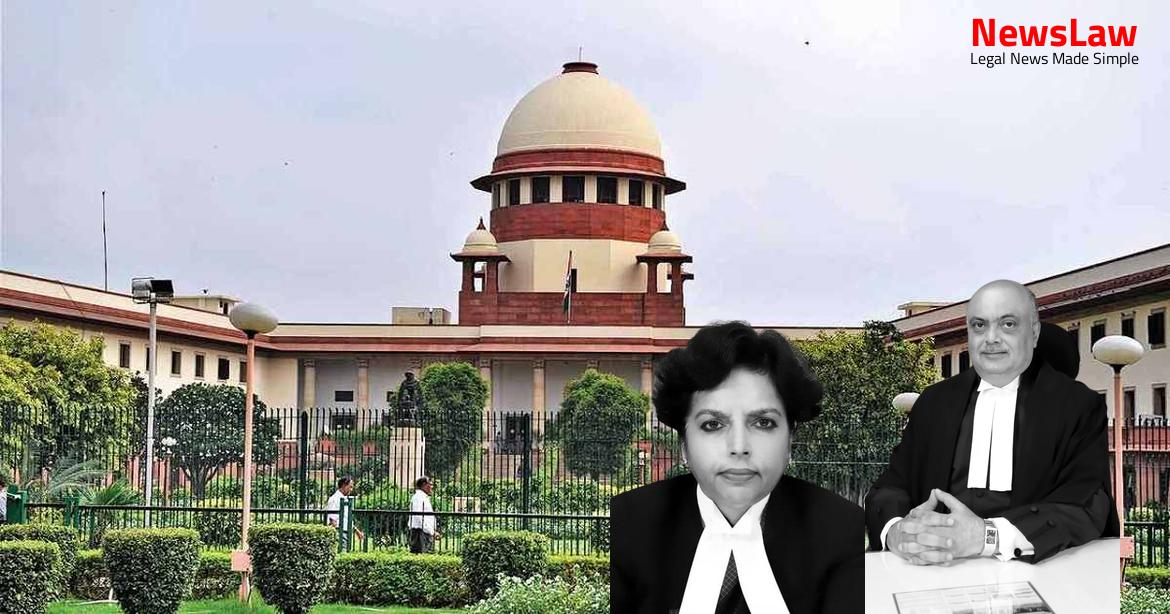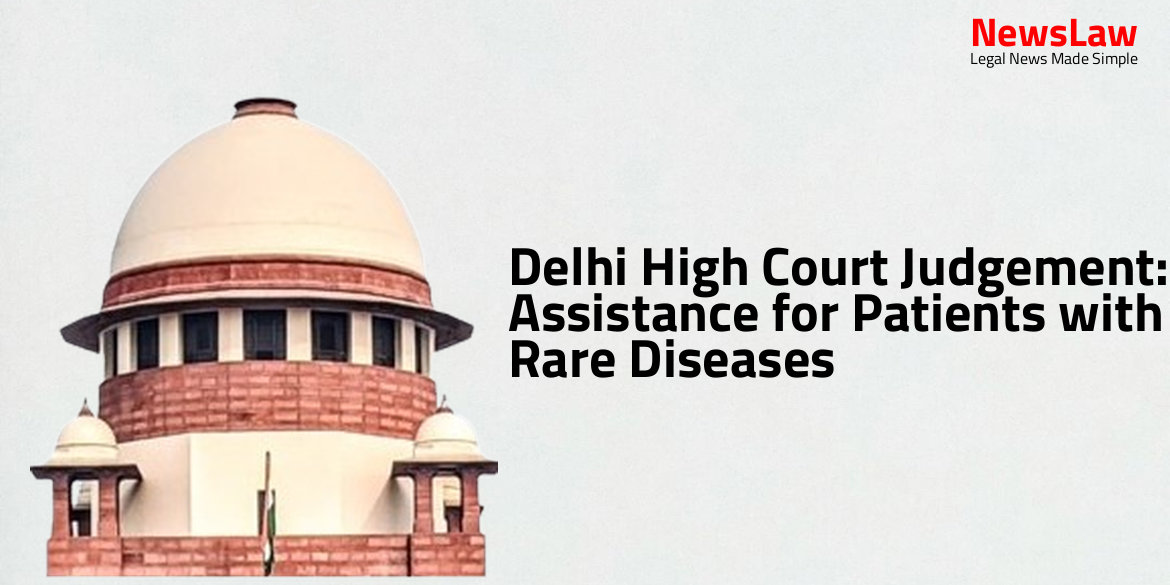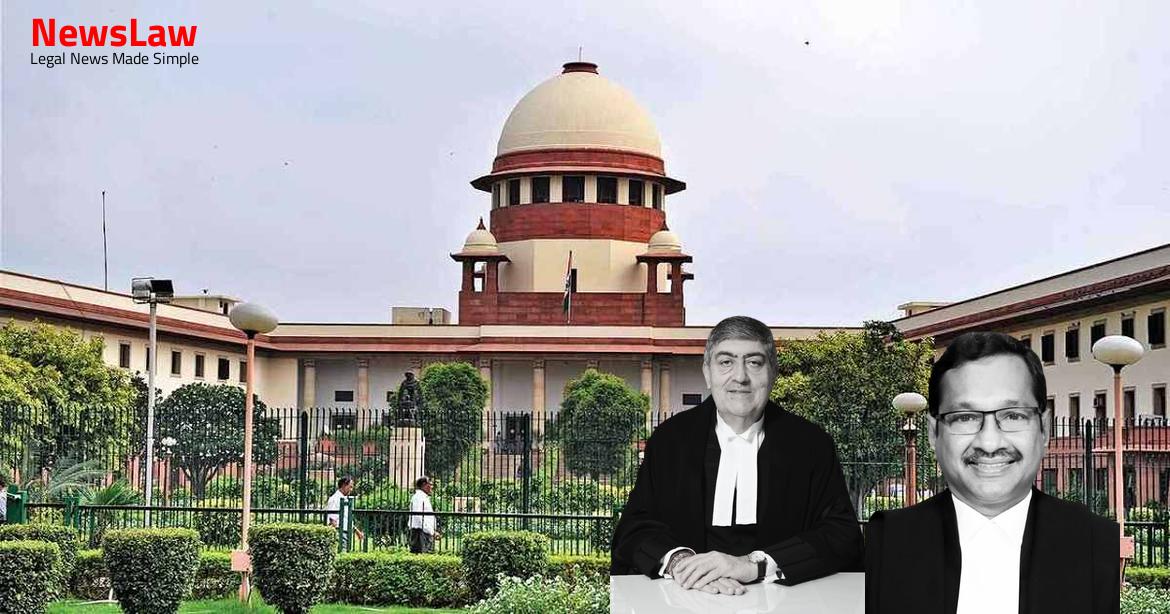The legal battle between the A.S. Raghavendra vs. The M/S Bharti Airtel Limited over the workman status dispute has taken a new turn. The Court has revisited the judgment, reinstating the Labour Court’s decision. Stay tuned to explore the intricacies of this case involving the classification of the Respondent in the industrial setup.
Facts
- The respondent was appointed as the Regional Business Head (South) – Government Enterprise Services in 2009.
- The Labour Court’s Award found the respondent to be performing the role of a Manager and not a ‘workman’.
- The High Court partly allowed the respondent’s writ petition based on a previous judgment.
- The High Court held that the respondent’s lack of power to appoint, dismiss, or hold disciplinary inquiries against other employees indicated he was a ‘workman’.
- The award was set aside and the matter remanded to the Labour Court for further adjudication.
- Respondent was initially a Team Leader and Regional Business Head in the Government Enterprise Services.
- He had a team of four Account Managers under his supervision for different states.
- The Respondent resigned on 24.03.2011, which was accepted by the Appellant on 09.05.2011.
- Despite objections regarding the application of Industrial Disputes Act due to his managerial role and salary package, the dispute was referred to the Labour Court by the Government of Karnataka on 27.06.2013.
- The Respondent received Rs.5,92,538/- as full and final settlement of all his claims.
Also Read: Date of Birth Discrepancy: Barsua Iron Ore Mines v. Employee
Issue
- The moot issue is whether the respondent would or would not come within the definitional stipulation of a ‘workman’ as laid out under Section 2(s), ID Act.
- The definition of ‘workman’ includes any person employed in any industry to do manual, unskilled, skilled, technical, operational, clerical, or supervisory work for hire or reward.
- The definition also includes individuals who have been dismissed, discharged, or retrenched in connection with or as a consequence of an industrial dispute.
- Exceptions to the definition of ‘workman’ are outlined for individuals subject to specific military acts, employed in police service, in managerial or administrative capacities, or drawing high wages in a supervisory role with managerial functions.
- The story begins with the respondent being inducted into the appellant-Company on 22.06.2009.
Also Read: Police Excesses Case: Somnath vs. The State Of Maharashtra & Ors.
Arguments
- The petitioner argued that the respondent, based on 7 documents relied upon by himself, demonstrated being in a senior management cadre in charge of supervising accounts managers in four southern states which does not align with being classified as a workman.
- Emphasis was placed on the importance of natural justice prevailing in the case.
- Several judgments of the Supreme Court were cited to support the argument, highlighting errors made by the High Court in their judgment.
- The petitioner pointed out that the Labour Court correctly noted the respondent’s position as indicated in his appointment letter, which clearly stated he was a managerial cadre employee.
- It was highlighted that the absence of power to appoint, dismiss, or conduct disciplinary inquiries against other employees does not necessarily exclude the respondent from being in a managerial capacity.
- Reiteration was made regarding the nature of duties performed by the respondent, emphasizing that they were clerical in nature and not managerial or supervisory.
- The respondent’s contention that the resignation was obtained under coercion was strongly argued, along with the assertion that the appellant’s telecommunications enterprise had a separate division liaising with government departments.
- Judgments were cited to support the rejection of the industrial dispute raised by the respondent.
- The stand that the respondent had accepted the events following his resignation and was not a workman due to his designation and salary was emphasized.
- The interference by the High Court was deemed erroneous, and the Labour Court’s detailed order was cited as comprehensive and needing no intervention.
- The respondent has cited cases like Devinder Singh v. Municipal Council, Sanaur and Shankarbhai Nathalal Prajapati v. Maize Products to support their contentions.
- They have also referred to a Suo-Motu Contempt Petition and the case of Suzuki Parasrampuria Suitings.
- The respondent has pointed out discrepancies in the appellant’s stand before different forums.
Also Read: RKK vs. ACK: Dispute Over Family Properties
Analysis
- In a big set-up, power may be invested in superior officers at divisional or regional levels.
- The judgment in S K Maini is innocent of Ved Prakash Gupta, but there is no inconsistency in the statement of law laid down in S K Maini.
- Law and Economics is relevant in the current era of economic liberalisation and globalisation.
- The interface between law and other sciences, including social and natural/physical sciences, is crucial in decision-making.
- Courts are increasingly considering economic arguments in their decisions.
- The Court emphasizes that the entire organization would not be against one individual and questions the claim that such a high-caliber individual would be forced to resign.
- The judgments cited by the respondent are deemed irrelevant to the current case.
- Efforts are made at all levels for the country to become a fully developed economy.
- The Court makes it clear that specific provisions of law cannot be ignored while considering various factors.
- The phrase ‘not of his free will’ does not necessarily mean being forced by the Company to resign.
- The appellant’s duty as a Security Inspector is analyzed to determine the workman status.
- The Labour Court’s finding that the appellant is not a workman is considered as perverse.
- The Court clarifies that employees cannot dictate terms of their employment to the employer.
- The respondent’s claim of being one of the best performers is acknowledged, but the Court remains unconvinced about the forced resignation.
- Annexure of the Appointment Letter lists the perks received by the respondent.
- The fixed pay and SIP of the respondent are specified in the orders.
- The respondent had previous managerial experience before joining the appellant-Company.
- Evidence presented shows the respondent’s role as a senior manager in charge of supervising a team.
- The Court reviews the positions held by the respondent in various organizations.
- The Labour Court’s decision regarding the respondent’s workman status is discussed in detail.
- The Impugned Judgment and the judgement by the Single Judge are deemed unsustainable after careful consideration.
- Some branches of Law have a significant impact of Economics, influencing legal principles.
- The specific designation of the respondent as ‘Senior Manager(B2) – Sales’ is highlighted from the Appointment Letter.
- Resignation cannot be labeled as forced due to lack of proper appreciation or rightful due given to the employee.
- The nature of duties performed by the employee does not fall under Section 2(s) of the Industrial Disputes Act.
- No direct allegations of bias or victimization against the employee, as he himself has expressed his grievances to various persons.
- Mere dissatisfaction with the outcome or grievance resolution does not imply that the resignation was forced by the company.
- If the resignation is labeled as forced, it should be attributed to the employee’s compulsion rather than factors related to the company or management.
Decision
- The respondent is declared as not a ‘workman’
- Reference to the Labour Court under the ID Act against the appellant is not maintainable
- Judgment of the Labour Court is revived and restored
Case Title: M/S. BHARTI AIRTEL LIMITED Vs. A.S. RAGHAVENDRA (2024 INSC 265)
Case Number: C.A. No.-005187-005187 / 2023



